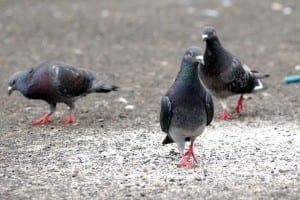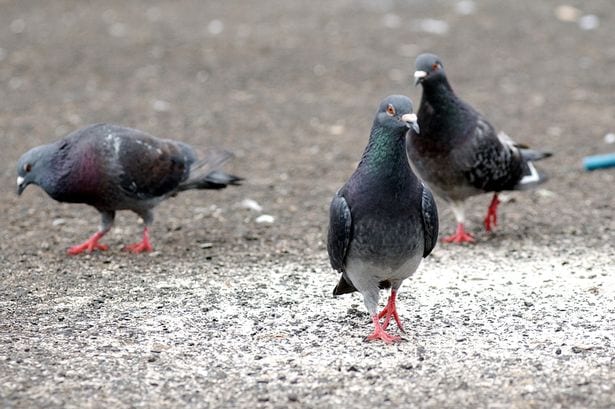Many animals will sound an alarm to alert other members of their group of impending danger. Now, researchers reporting in Current Biology on November 9 have shown that crested pigeons do this in a surprisingly non-vocal way. One of their main flight feathers produces a critical high-pitched sound as the birds fly away. As they flap faster to escape a predator, that alarm signal automatically increases in tempo.

Importantly, the researchers also show that other crested pigeons flee when they hear that sound. The findings confirm that the sound is a bona fide signal, not just a side effect of flight.
“Crested pigeons signal danger with noisy wings, not voices,” says Trevor Murray of The Australian National University. “It shows that birds really can use their feathers as ‘musical instruments’ to communicate with others.”
Charles Darwin proposed the idea of non-vocal “instruments” in birds about 150 years ago, but it has been a difficult idea to test. Scientists had long known that crested pigeons make loud sounds when they fly. For that reason, they are sometimes called “whistle-winged pigeons.” The Australian National University lab led by Robert Magrath earlier found that other pigeons pay attention to those sounds.
To confirm that the whistling feathers were indeed an alarm signal, in this new study, the researchers shot high-speed video and conducted feather-removal experiments. These studies show that the birds’ unusually narrow eighth primary wing feather produces a distinct note with each downstroke. The sound also changes as birds flap faster, such that those fleeing danger produce wing sounds with a higher tempo.
In fact, the birds’ wings produce alternating high and low notes in flight. The researchers’ experiments showed that the eighth primary wing feather is responsible for the high notes. The low notes come from the ninth primary feather. But, playback experiments showed, only the high notes are critical for sounding an alarm.
When the researchers played flight sounds to other pigeons, individuals were much more likely to flee upon hearing the flight of a bird with an intact eighth primary feather. When they played the sound of a pigeon with that eighth feather removed, they often just looked around instead of taking off.
“We show that the crested pigeon produces an acoustic alarm signal with its wings and that it is an intrinsically reliable signal of danger,” Murray says. “The alarm signal is intrinsically reliable because pigeons flap faster to escape predators, and this fast flapping automatically produces the high-tempo alarm signal.”
Crested pigeons are not the only birds known to produce unusually loud sounds with their wings, the researchers note. Pigeons in general fly noisily. Hummingbirds and manikins are also well known for their wing sounds. They hope that future studies will explore the evolution of wing sounds in other bird species.
“Birds have such prominent voices, we have largely ignored their surprisingly complex instrumental sounds,” Magrath says.
Pigeon Patrol Products & Services is the leading manufacturer and distributor or bird deterrent (control) products in Canada. Pigeon Patrol products have solved pest bird problems in industrial, commercial, and residential settings since 2000, by using safe and humane bird
deterrents with only bird and animal friendly solutions. At Pigeon Patrol, we manufacture and offer a variety of bird deterrents, ranging from Ultra-flex Bird Spikes with UV protection, Bird Netting, 4-S Bird Gel and the best Ultrasonic and audible sound devices on the market today.
Voted Best Canadian wholesaler for Bird Deterrent products ten years in a row.
Contact us at 1 877-4-NO-BIRD,(604) 585-9279 or visit our website at www.pigeonpatrol.ca
Pigeon/Pigeon Patrol / Pigeons Roosing / Vancouver Pigeon Control / Bird Spikes / Bird Control / Bird Deterrent / PIgeon Deterrent / Surrey Pigeon Control / Pest / Seagull deterrent / Vancouver Pigeon Blog / Birds Inside Home / Pigeons in the cities / Ice Pigeons / What to do about pigeons / sparrows, Damage by Sparrows, How to Keep Raccoons Away, Why Are Raccoons Considered Pests / De-fence / Pigeon Nesting / Bird Droppings / Pigeon Dropping / woodpecker control / Professional Bird Control Company / Keep The Birds Away / Birds/rats/seagull/pigeon/woodpecker/dove/sparrow/pidgeon control/pidgeon problem/pidgeon control/flying rats/pigeon problems/ bird netting/bird gel/bird spray/bird nails/bird guard

